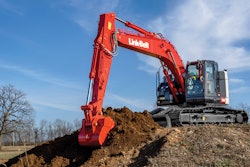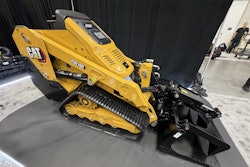If you could have only one machine to work with, most contractors would choose the backhoe. But in recent years manufacturers have come up with a variety of compact, single-purpose machines that are challenging the backhoe’s status as a must-have piece of equipment.
To find out more about how, where and when contractors are substituting compact loaders for backhoes we talked with Dan Moore, president, and Austin Robertson, utility sales manager at R.W. Moore Equipment, a large, full-service dealer that sells John Deere, Takeuchi, ASV, Sakai and other brands of equipment in Raleigh, North Carolina. For the purpose of this discussion we’ve kept the definition of a compact loader loose, to include compact wheel loaders, skid steers and rubber-track loaders.
Size and jobsite accessibility
With buckets on both ends and stabilizers to contend with, the backhoe is a big machine. For plumbing and footing contractors, this can be an issue. “Residential sites are getting more compact, and the backhoe can be bulky and unproductive in these situations,” Robertson says. Getting into position, finding someplace to set the loader bucket and putting the stabilizers down is time consuming, especially if there is gravel, lumber or other material in the way. Most compact loaders can counter-rotate, or turn in their tracks, making it much easier to zip around a crowded jobsite.
Advantage: compact loaders
Weight and flotation
The average backhoe is heavy, anywhere from 13,000 to 16,000 pounds, Moore says. The typical compact loader is half that. This can be a crucial difference when you’re trying to work in muddy or soft soils. “You can work work a backhoe through some amazingly bad conditions,” Moore says, “but you’ll leave two ruts about 21/2 feet deep and the skid marks from the belly pan. With a compact track loader you can drive across the same space and not even throw mud.” The lighter ground pressure of compact loaders also enables you to work in conditions that would sideline a backhoe and traverse lawns and other sensitive surfaces without leaving damage. The lighter machines can also be hauled by a half-ton or three-quarter-ton pickup, whereas a backhoe requires at a minimum a dump truck to haul it, Moore says.
Advantage: compact loaders
Utilization
Although you can do a lot with a backhoe, you can never do more than half of what it’s capable of doing at any one time – whether you’re digging or loading, half the machine is not being used. “A compact loader with a compact excavator is twice as productive as a backhoe alone,” Robertson says. “While one guy is digging the footer, the other can be placing gravel so they’re killing two birds with one stone. In addition, the machines can be separated to work on two different sites at one time.”
Advantage: compact loaders (when paired with other compact machines)
Capacity
A backhoe’s weight and size give it the edge when it comes to the ability to dig deep and carry heavy loads. The average backhoe digs as deep as 12 to 14 feet, has no trouble carrying 1 to 2 cubic yards of material in its bucket and can pick and place concrete pipe, big pallets of brick and block and other heavy loads.
Advantage: backhoes
Attachments
“We have a lot of customers who ask us to put a tool carrier option or flip-over forks on their backhoes,” Moore says. “They use it as a kind of all-in-one, rough-terrain forklift and pipe carrier.” But there are also dozens of attachments that have been created for skid steers and compact loaders, particularly in the landscaping industry: augers, box blades, rakes, trenchers, mulchers and such.
Advantage: backhoes for carrying capacity, compact loaders for versatility
Speed
Another plus for backhoes is their speed, both travel and working. If you need to road the machine from jobsite to jobsite, or work across a large jobsite with many trips, the speed of the backhoe is going to far outweigh the flexibility of the skid steer or compact track loader.
Advantage: backhoes
Verdict
The compact market has taken away a substantial amount of the backhoe market, a trend that will continue to increase, Moore says. “The customers I see are looking for a way to make themselves more flexible and more efficient,” he says. “They’re looking for little improvements that allow them to do their jobs a little better, and if a different piece of equipment can do it they’ll reshuffle their organization. Backhoes used to be one of the largest segments that we sold to. It’s still very large, but it’s nowhere what it was.”








